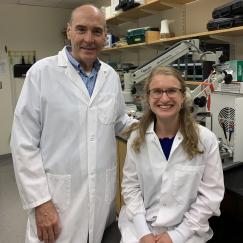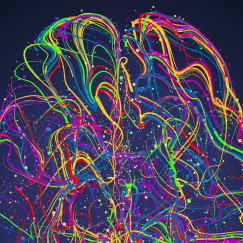Recognizing his research advancing understanding of how the brain changes with experience by altering the strength of connections among neurons, a phenomenon called “synaptic plasticity,” the Society for Neuroscience announced Oct. 30 that it has named Picower Professor Mark Bear a co-recipient of the 2023 Julius Axelrod Prize.
The prize honors scientists with distinguished achievements in the broad field of neuropharmacology or a related area and exemplary efforts in mentoring young scientists. Endowed by the Eli Lilly and Company Foundation, it includes a $30,000 prize and travel to the SfN’s annual meeting in Washington DC Nov. 11-15, where Bear and co-recipient Raymond Dingledine of Emory University will receive the awards. Recipients are invited to give the keynote address at a National Institutes of Health symposium next spring.
In its announcement, SfN wrote: “Bear fundamentally advanced our understanding of experience‐dependent plasticity in the mammalian brain. He and his students showed that NMDA receptors trigger long‐term depression (LTD) as well as long‐term potentiation (LTP) in the cortex, that the properties of LTD and LTP are themselves 'metaplastic' and depend on the recent history of cortical activity and that these bidirectional synaptic modifications and metaplasticity are essential for development of the visual cortex. His lab’s demonstration of LTD in the hippocampus was paradigm‐shifting, opening the door to numerous studies of the fundamental molecular mechanisms of synaptic modification. Their finding that LTD is impacted in several developmental disorders led to the insight that excess protein synthesis downstream of the glutamate receptor mGlu5 is a core driver of the synaptic, circuit, and behavioral dysfunction seen in Fragile X Syndrome, the most common form of inherited intellectual disability and a leading monogenic cause of autism. This work ushered in a sea change in how this and other developmental brain disorders are viewed medically and has led to numerous clinical trials in both Fragile X and autism.
“Additionally, Bear is an extraordinary mentor, with 18 of his 35 former postdoctoral researchers and 11 of his former PhD students now in tenure track positions. He is known for his positivity, optimism, and steadfast enthusiasm for science — even in the face of the challenges that research and funding present — and through his mentorship he passes these essential traits on to the next generation of scientists.”
Bear said he is delighted and honored to receive this award.
“Recognition for mentorship is particularly meaningful,” Bear said. “The greatest satisfaction of my career has been to help my undergraduate students, graduate students, and postdocs mature into the fantastic scientists they are today. I am proud of their many accomplishments, and very grateful for their key contributions to our studies of brain plasticity.
“It is also very meaningful to receive an award that commemorates Julius Axelrod,” Bear continued. “Dr. Axelrod received the 1970 Nobel Prize for his studies of neurotransmitters called catecholamines. His discoveries influenced my own, as my first studies as a graduate student focused on the involvement of catecholamines in the regulation of plasticity of visual cortex.”
Previous Axelrod Prize honorees with Picower Institute ties include 2020 winner Morgan Sheng, Professor of Brain and Cognitive Sciences and Picower Institute affiliate faculty member, and 2009 winner Michael Greenberg, a professor at Harvard University who serves on The Picower Institute Scientific Advisory Board (SAB).
Also on Oct. 30, SfN announced that another Picower Institute SAB member, Eric Nestler of the Icahn School of Medicine at Mt. Sinai, is a co-recipient of the society’s Peter Seeburg Integrative Neuroscience Prize.






